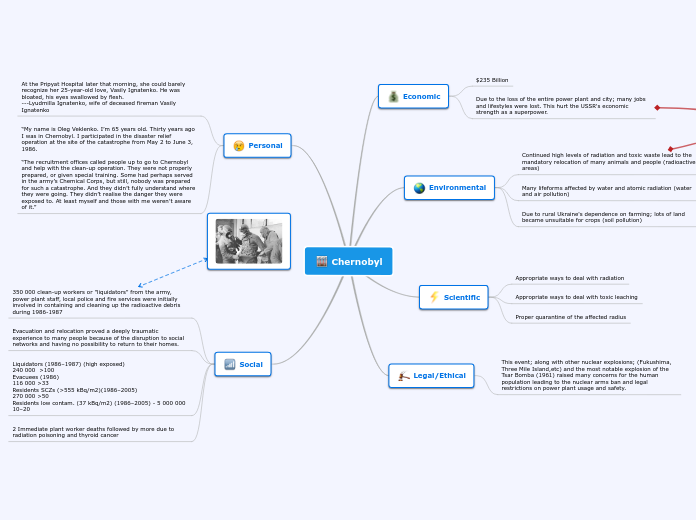Chernobyl
Economic
$235 Billion
Due to the loss of the entire power plant and city; many jobs and lifestyles were lost. This hurt the USSR's economic strength as a superpower.
Environmental
Continued high levels of radiation and toxic waste lead to the mandatory relocation of many animals and people (radioactive areas)
Many lifeforms affected by water and atomic radiation (water and air pollution)
Due to rural Ukraine's dependence on farming; lots of land became unsuitable for crops (soil pollution)
Scientific
Appropriate ways to deal with radiation
Appropriate ways to deal with toxic leaching
Proper quarantine of the affected radius
Legal/Ethical
This event; along with other nuclear explosions; (Fukushima, Three Mile Island,etc) and the most notable explosion of the Tsar Bomba (1961) raised many concerns for the human population leading to the nuclear arms ban and legal restrictions on power plant usage and safety.
Personal
At the Pripyat Hospital later that morning, she could barely recognize her 25-year-old love, Vasily Ignatenko. He was bloated, his eyes swallowed by flesh.
---Lyudmilla Ignatenko, wife of deceased fireman Vasily Ignatenko
“My name is Oleg Veklenko. I’m 65 years old. Thirty years ago I was in Chernobyl. I participated in the disaster relief operation at the site of the catastrophe from May 2 to June 3, 1986.
“The recruitment offices called people up to go to Chernobyl and help with the clean-up operation. They were not properly prepared, or given special training. Some had perhaps served in the army’s Chemical Corps, but still, nobody was prepared for such a catastrophe. And they didn’t fully understand where they were going. They didn’t realise the danger they were exposed to. At least myself and those with me weren’t aware of it.”
Social
350 000 clean-up workers or "liquidators" from the army, power plant staff, local police and fire services were initially involved in containing and cleaning up the radioactive debris during 1986-1987
Evacuation and relocation proved a deeply traumatic experience to many people because of the disruption to social networks and having no possibility to return to their homes.
Liquidators (1986–1987) (high exposed)
240 000 >100
Evacuees (1986)
116 000 >33
Residents SCZs (>555 kBq/m2)(1986–2005)
270 000 >50
Residents low contam. (37 kBq/m2) (1986–2005) - 5 000 000 10–20
2 Immediate plant worker deaths followed by more due to radiation poisoning and thyroid cancer
